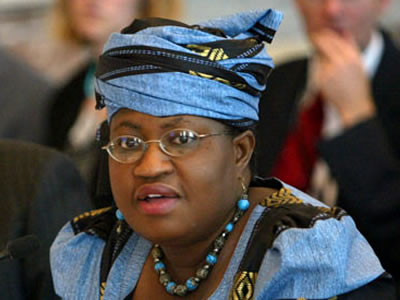Okonjo-Iweala Accuses Lawmakers of Collecting N17billion Bribe To Pass
2015 Budget
Former finance minister Ngozi Okonjo-Iweala has revealed the blackmail and
arm twisting that characterised budget passing by the National Assembly
during the Goodluck Jonathan Administration.
She cited an instance in 2015 when the National Assembly leadership forced
the executive arm to part with N17 billion for the federal lawmakers to
pass that year’s budget.
That, she said, was at a time crude price had gone down drastically.
The N17 billion alleged bribe, according to Okonjo-Iweala in her book
Fighting Corruption is Dangerous:The Story Behind the Headlines, was
besides the NASS N150 billion annual ‘standard’ budget.
She described federal legislators as a tough political group to deal with.
Her words: “The legislature was concerned largely about three things—the
size of its own budget; the nature and the size of the capital budget,
particularly investment projects; and the number and geographical location
of the projects.
“Senators and Representatives felt that their role as appropriators of the
budget was not just to vet and approve budget parameters and oversee
budget implementation, but also to shape the size and content of the
budgets, including details of specific projects.”
She said members of the NASS Finance and Appropriation even felt ”they had
the right–indeed the duty–to get into the details of the budget
formulation and preparation process all along the budget value chain.”
The ex-minister said the NASS leadership, working through the various
committees, “sought to add more to individual projects or create
completely new, unappropriated major projects, thereby distorting the
budget.”
But she explained that “not all National Assembly members supported these
unfortunate manipulations of the budget.”
She added: “National Assembly members had negotiated large increases in
the National Assembly budgets and would brook no discussions or challenges
on the issue.
“Their operational budget had ballooned to N150 billion or 16 per cent of
the budget and almost 3.5 times the 2006 budget (in naira).”
Okonjo-Iweala said when it was proposed that the lawmakers should give up
some of their benefits in view of dwindling revenue in 2015, they bluntly
refused to do so.
“By the time we presented the budget on December 16, 2014, oil prices had
fallen further to $58 per barrel.
“We were prepared and we knew we had to trigger the additional expenditure
and revenue measures in 2015 to make the budget work.
“This would be tough, given that we had entered an election year,” she said.
”Indeed, legislators initially refused to accept any cuts to their
regular N150 billion budget, despite dwindling revenues.
“But eventually, they agreed to a 13 per cent cut against a backdrop of
ministers accepting a voluntary 50 per cent cut to their basic salaries.
“In a tough session with the National Assembly’s ad hoc committee on the
budget (made up of chairs of the Finance Committee and Appropriation
Committee of both chambers and other leaders of the National Assembly), an
additional N20 billion was re-introduced as election expenses for National
Assembly members.
“We insisted the amount be dropped because it nullified the 13 per cent
cut made to their statutory budget, but managed to reduce the N20 billion
figure by only N3 billion to N17 billion.
“This became the price to pay to have the 2015 budget passed.”
Okonjo-Iweala was Jonathan’s finance minister from August 17, 2011 to May
29, 2015.
She had served in the same capacity in the Obasanjo government.
The Federal Government proposed to spend N4.454 trillion that year.



